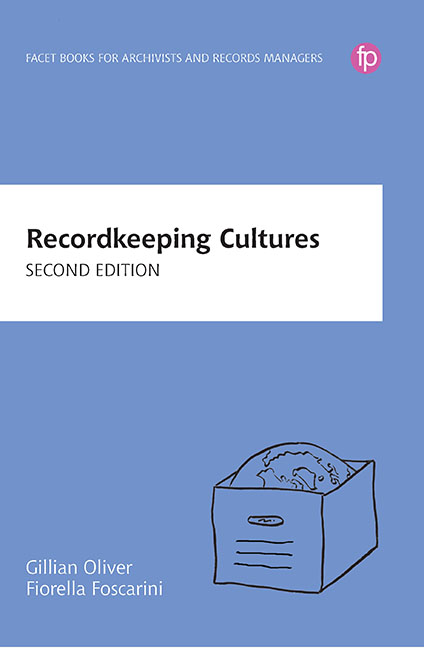8 - The Metalevels: Language and Trust
Published online by Cambridge University Press: 28 October 2020
Summary
This chapter is concerned with two features that can be related to any of the three ICF levels, namely, language and trust. The first part of the chapter introduces the idea of language as a socially constructed phenomenon. After examining the impact of the English language on recordkeeping it considers the local usage of certain terms by the members of specific workplace communities (i.e. their ‘vernacular’) and the relationship among different professional/technical languages, or jargons, within organisations. One of the purposes of this section is to uncover the rhetorical and social aspects of writing and speaking in the workplace. The underlying framework is provided by ideas derived from Rhetorical Genre Studies (RGS). Readers who wish to know more about the genre approach will find a dedicated section in Chapter 9 (pp. 160–2).
The second part of the chapter explores the notion of trust in the context of the ICF, in particular, people's trust in recordkeeping systems and processes. In Chapter 3 we considered another aspect of trust as reflected in preferences for different types of information: the likelihood of people placing more trust in their social network as a source of information as opposed to textual resources, and vice versa. In this chapter the focus is on shared practices and perceptions of those practices. In particular we will examine whether employees trust the systems that have been established within their organisations to manage records. The section begins by discussing archival perspectives on trust and trustworthiness, and identifies initiatives that have been developed to demonstrate trust, particularly by the digital preservation community. As our information culture perspectives are concerned with the ways that people feel and behave, our focus then turns to discussion of the consequences of lack of trust in organisational systems. Assessment techniques acknowledge the existing tools and methods that have been developed to address this area, but encourage going further, to find out how users regard the systems that have been set up, and the section on interventions explains the notion of reflective practice.
Another objective of the sections on assessment and interventions, and of the chapter as a whole, is to show how records professionals can contribute to making language more suitable to their purposes.
- Type
- Chapter
- Information
- Recordkeeping Cultures , pp. 127 - 150Publisher: FacetPrint publication year: 2019



